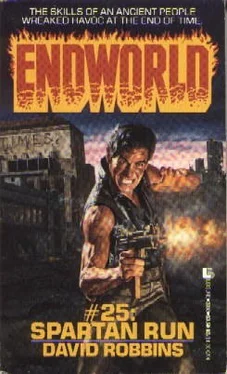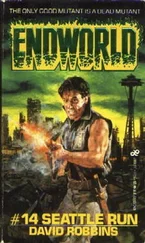David Robbins - Spartan Run
Здесь есть возможность читать онлайн «David Robbins - Spartan Run» весь текст электронной книги совершенно бесплатно (целиком полную версию без сокращений). В некоторых случаях можно слушать аудио, скачать через торрент в формате fb2 и присутствует краткое содержание. Город: New York, Год выпуска: 1991, ISBN: 1991, Издательство: Leisure Books, Жанр: sf_postapocalyptic, Боевая фантастика, на английском языке. Описание произведения, (предисловие) а так же отзывы посетителей доступны на портале библиотеки ЛибКат.
- Название:Spartan Run
- Автор:
- Издательство:Leisure Books
- Жанр:
- Год:1991
- Город:New York
- ISBN:978-0843930801
- Рейтинг книги:5 / 5. Голосов: 1
-
Избранное:Добавить в избранное
- Отзывы:
-
Ваша оценка:
- 100
- 1
- 2
- 3
- 4
- 5
Spartan Run: краткое содержание, описание и аннотация
Предлагаем к чтению аннотацию, описание, краткое содержание или предисловие (зависит от того, что написал сам автор книги «Spartan Run»). Если вы не нашли необходимую информацию о книге — напишите в комментариях, мы постараемся отыскать её.
Spartan Run — читать онлайн бесплатно полную книгу (весь текст) целиком
Ниже представлен текст книги, разбитый по страницам. Система сохранения места последней прочитанной страницы, позволяет с удобством читать онлайн бесплатно книгу «Spartan Run», без необходимости каждый раз заново искать на чём Вы остановились. Поставьте закладку, и сможете в любой момент перейти на страницу, на которой закончили чтение.
Интервал:
Закладка:
“Not for a Spartan.”
“Why don’t you just go your way and forget we ever bumped into each other?” Blade suggested. He’d already spilled enough Spartan blood for one day. In light of the rigid Spartan system, he tended to regard all their soldiers as mere pawns. They were superb warriors; of that there could be no doubt. But the Spartans had been conditioned to obey their superiors without question. Independent thoughts and actions were strictly forbidden. In the final analysis, the Spartan system bred perfect fighting machines.
One of those machines now shook his head a trifle wistfully. “I wish we could, but now that I know the situation I.m bound to my oath to slay you.”
“Why not just report to your barracks? No one will ever know.”
The sergeant tapped his chest with the hilt of his sword. “I’d know. And I couldn’t live with the shame of knowing I’d failed my king and violated my vow.”
Unexpectedly, Rikki-Tikki-Tavi took three strides and addressed the noncom. “I knew a Spartan once, a fine man who went by the name of Thayer. He told me that it wasn’t his real name, that he’d lost the right to use his real name when he was banished from Sparta. Perhaps you knew him?”
“There have been a few soldiers who were banished in recent years,” Thoas replied. “Most were men of distinction. Describe this man.”
“He was a tall man, about six feet eight or nine.”
“Ahhh,” Thoas said. “Very few Spartans have been that tall. You must be referring to Captain Sarpedon. He was an officer in the royal bodyguard, in King Agesilaus’s contingent to be exact. One day a few Helots decided they were going to repay the king for the death of someone in their family. They gathered together about, forty malcontents and tried to slay Agesilaus while he slept. Sarpedon was on duty at the time.”
Rikki nodded. “The details of your story match with his.”
“As I recall, Sapredon’s son was also in the guard detail. When his son was killed, Sarpedon left his post at the king’s door and ran to the boy’s side.”
“And for such a natural act, Sarpedon was banished from Spartan and his name removed from the plague of distinction that commemorates exceptional Spartans. He told me all about it.”
“King Agesilaus banished him,” Thoas disclosed. “Personally, I disagreed with the punishment, but there was nothing anyone could do. The judgments of the kings are final.” He sighed. “King Agesilaus delights in banishing officers for the slightest of infractions.”
“And this is the man you’re willing to die for?” Blade inquired.
“I have no choice.”
“Yes, you do,” Rikki said. Sergeant Thoas regarded the man in black quizzically. “Explain, please.”
“I grew to know Captain Sarpedon very well before he died,” Rikki said.
“Thanks to him, I was granted certain insights into the Spartan character. I won’t claim to comprehend the Spartan way completely, but I believe I know enough to make you a sound offer.”
“What kind of offer?”
“You and I will fight, one on one. If I win, we’ll be permitted to go our way without interference. Should you win, we’ll let you take us into custody without resisting.”
“We will?” Teucer interjected.
“This is a most unusual offer,” replied Sergeant Thoas. “What makes you think I’ll accept?”
“Because I know a Spartan never refuses a challenge and never tolerates an insult to his honor. So I challenge you, Thoas, here and now. And if you refuse, you will have shamed yourself in the eyes of all your men.”
Blade took a step and placed his right hand on the martial artist’s shoulder. “Now wait a minute. I haven’t agreed to this.”
Rikki looked over his shoulder. “Would you rather we take all of them on?”
“No,” Blade admitted. He stared at the open SEAL door, estimating the odds of all three of them getting inside before the soldiers could reach them. The chances were slim. So either he agreed to his friend’s proposal or they fought with all eight Spartans.
The noncom chuckled. “You present a most devious challenge, little one. You’re pitting my personal honor against my duty to my king.”
“This is a way for you to satisfy both.” Rikki said.
“And I’m almost tempted to accept your challenge,” Thoas responded.
“But to a Spartan, duty must always come first.” He turned to his fellows.
“Slay them.”
Without a moment’s hesitation, the members of the patrol attacked.
His katana gleaming in the sunlight, Rikki moved forward to meet them. He held his sword in the middle position, the chudan-no-kumae , and braced for the onslaught of the two foremost Spartans, Sergeant Thoas and one other.
They never reached him.
An arrow whizzed past Rikki and struck the noncom in the throat, and a second shaft an instant later caught the other soldier in the center of the chest. Both men went down.
The next pair hardly missed a beat. Rikki let them come at him, let them part and spring at him from the right and the left, let them think they had the upper hand, the edge, as it were, of numbers and size, and then he showed them a different edge, the only one that mattered to a practitioner of kenjutsu , to a man who subscribed to the code of bushido .
Of all the Warriors, Rikki-Tikki-Tavi had always been the most devoted to the martial arts. His mild-mannered father, a former warrior who’d gone on to become a distinguished Elder, had been a black belt in karate.
Naturally, his father had delighted in teaching the way of the warrior to him, and had encouraged his avid interest. By the time he turned six, Rikki could perform flawless kata. By the time he turned ten, he was regarded as the best martial artist in the history of the Family.
During his teens he worked diligently at increasing his knowledge and skills. Eventually, he qualified for Warrior status. One of the most memorable moments in his life came when the Elders decided to bestow the katana on him.
Out of the hundreds of hundreds of weapons in the vast Family armory, all of which had been personally stockpiled by the Founder prior to the war, there had only been the one genuine katana. There were firearms galore, as well as various miscellaneous weapons, racks upon racks of them: rifles, shotguns, revolvers, pistols, submachine guns, bows, spears, knives, and many, many more. None of them had interested Rikki.
He’d always wanted the katana.
Forged in Japan hundreds of years ago by a master craftsman, the sword had been initially owned by a famous samurai. Thereafter, from generation to generation, the sword had passed from father to son until, in the modern era, one of the samurai’s materialistic descendants had sold it at an auction to a private collector. Years later, while making a film in Japan, Kurt Carpenter had bought the sword.
In ancient times, a katana had been considered an extension of the heart and soul of its samurai wielder. After the collapse of Japan’s feudal system, when the code of bushido had become discredited by those in positions of authority who were trying to force the Japanese people to adopt modern ideals and a “better” way of life, the samurai had supposedly died out. Although they were officially suppressed, many samurai had simply gone underground, and until World War Three there had been secret samurai societies in existence, practicing the honored precepts of their illustrious ancestors.
Although the samurai supposedly had ceased to exist, their cherished sword had not. The level of craftsmanship had ensured the katanas would last for countless decades. Made of high-carbon steel, each blade had taken months to be constructed. The skilled smiths had applied layer after layer of carefully forged metal until the weapons they produced could cut through heavy armor. Such a sword rarely broke, rarely even became nicked, and retained its razor-sharpness indefinitely.
Читать дальшеИнтервал:
Закладка:
Похожие книги на «Spartan Run»
Представляем Вашему вниманию похожие книги на «Spartan Run» списком для выбора. Мы отобрали схожую по названию и смыслу литературу в надежде предоставить читателям больше вариантов отыскать новые, интересные, ещё непрочитанные произведения.
Обсуждение, отзывы о книге «Spartan Run» и просто собственные мнения читателей. Оставьте ваши комментарии, напишите, что Вы думаете о произведении, его смысле или главных героях. Укажите что конкретно понравилось, а что нет, и почему Вы так считаете.












